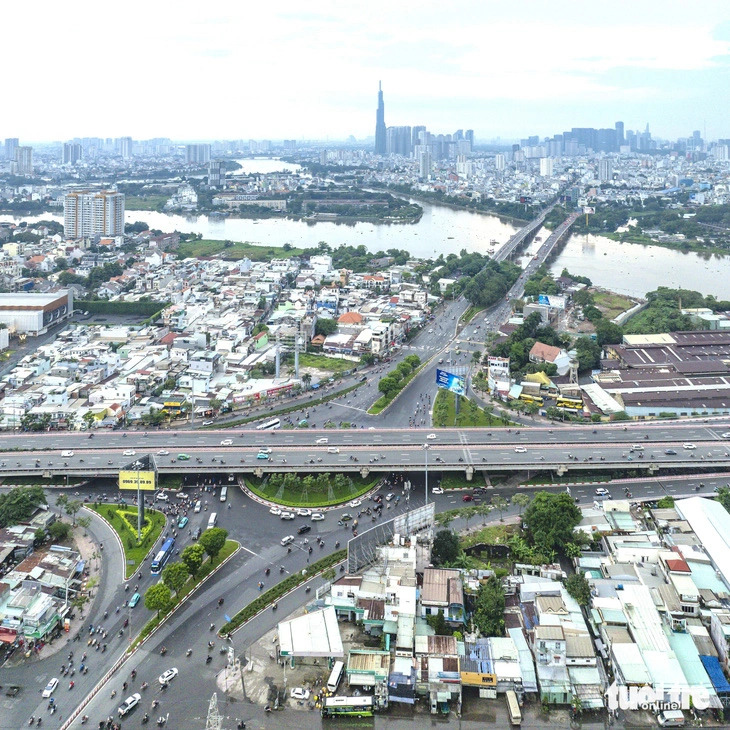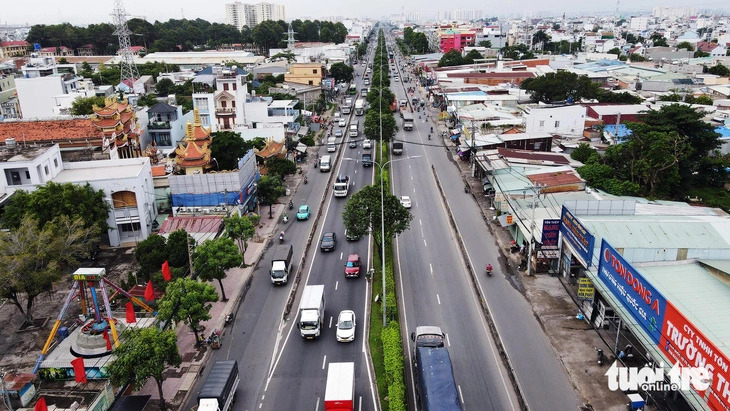Ho Chi Minh City has prepared five major infrastructure projects for expanding five gateway routes at a total cost of around US$2.37 billion, improving traffic, minimizing congestion, and facilitating the circulation of goods, according to the municipal Department of Transport.
The department said that these Build-Operate-Transfer (BOT) projects are expected to commence in 2026, costing an estimated VND60.2 trillion ($2.37 billion).
The state budget will cover 50-70 percent of the cost, with the remainder sourced from BOT investors through equity and bank loans.
On November 14, the department held a consultation conference on the pre-feasibility study report for these projects, which bank on Resolution 98 adopted by the National Assembly in June 2023 on the pilot implementation of specific policies for the development of Ho Chi Minh City.
The conference was attended by many investors and transport infrastructure constructors, including Ho Chi Minh City Infrastructure Investment JSC, Deo Ca Group, and Son Hai Group.
After pooling feedback on the projects from the conference, the department will perfect the pre-feasibility study report before submitting it to relevant bodies in the fourth quarter for consideration and approval, said departmental director Tran Quang Lam.
According to the agency’s plan, the projects are scheduled to go up for bidding in the third quarter of 2025 to select suitable investors.
The expansion and upgrade of the five gateways will integrate with various highways and beltways, creating a comprehensive traffic network.
This will significantly reduce congestion, facilitate easier commuting between the city and neighboring areas, and promote the rapid circulation of commodities, thereby boosting the city's socio-economic development.
In the first project, a 6km section of National Highway 13, from Binh Trieu Bridge in Ho Chi Minh City to Binh Duong Province, will be enlarged to have 10 lanes, four of them elevated.
The total investment in this project is estimated at nearly VND20 trillion ($787 million).
|
|
| A part of the 8.7km section of National Highway 22 from An Suong Intersection to Beltway 3 in Ho Chi Minh City, which will be expanded to 10 lanes. Photo: Phuong Nhi / Tuoi Tre |
The second project focuses on widening a 9.3km section of National Highway 1, from Kinh Duong Vuong Street in the city to Long An Province.
This expansion will increase the width to 60 meters, accommodating 10-12 lanes, with a total investment of approximately VND16 trillion ($630 million).
The third project involves an 8.6km section of the North-South axis road (Nguyen Huu Tho Street), from the Nguyen Van Linh intersection in the city to the Ben Luc - Long Thanh Expressway.
This section will feature an elevated route, with a total investment of nearly VND8.5 trillion ($334 million).
In the fourth project, the 3.7km Binh Tien bridge-road is designed to be 30-40 meters in width, connecting District 6, District 8, and Binh Chanh District, with a price tag of nearly VND6.9 trillion ($271 million).
The last project is on National Highway 22, of which an 8.7km section from An Suong Intersection to Beltway No. 3 will be expanded to 10 lanes, requiring an investment of over VND8.8 trillion ($346 million).
The toll on these upgraded and expanded routes will be based on the actual distance traveled, with residents living along the ways to enjoy a toll reduction or exemption.
Toll rates will be applied flexibly according to the following principles: the fare for traveling on the elevated roads is higher than that on the lower ones, while the fare during peak hours will be higher than that for off-peak hours and night-time.
Fee collection periods are expected to range from 15 to 20 years, according to consultants of the projects.
Bui Van Quan, chairman of the Ho Chi Minh City Transport Association, advocated careful consideration of the toll collection plan, suggesting that increasing the state capital in these projects could shorten the toll collection period, thereby reducing challenges for the private investors.
He noted that congestion on gateway routes in recent years has impacted traffic and the flow of goods.
Therefore, the planned upgrades are highly desired by both residents and transport businesses.
Dr. Tran Du Lich, chairman of the Advisory Council for the Implementation of Resolution 98, commented that it would be too late for these projects to start in 2026, as per the Department of Transport's plan, suggesting an accelerated pace so that one or two of them could break ground this year.
Like us on Facebook or follow us on Twitter to get the latest news about Vietnam!



















































